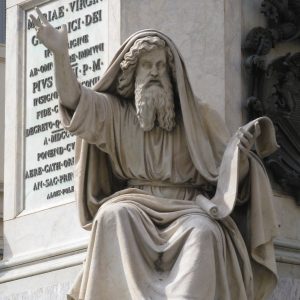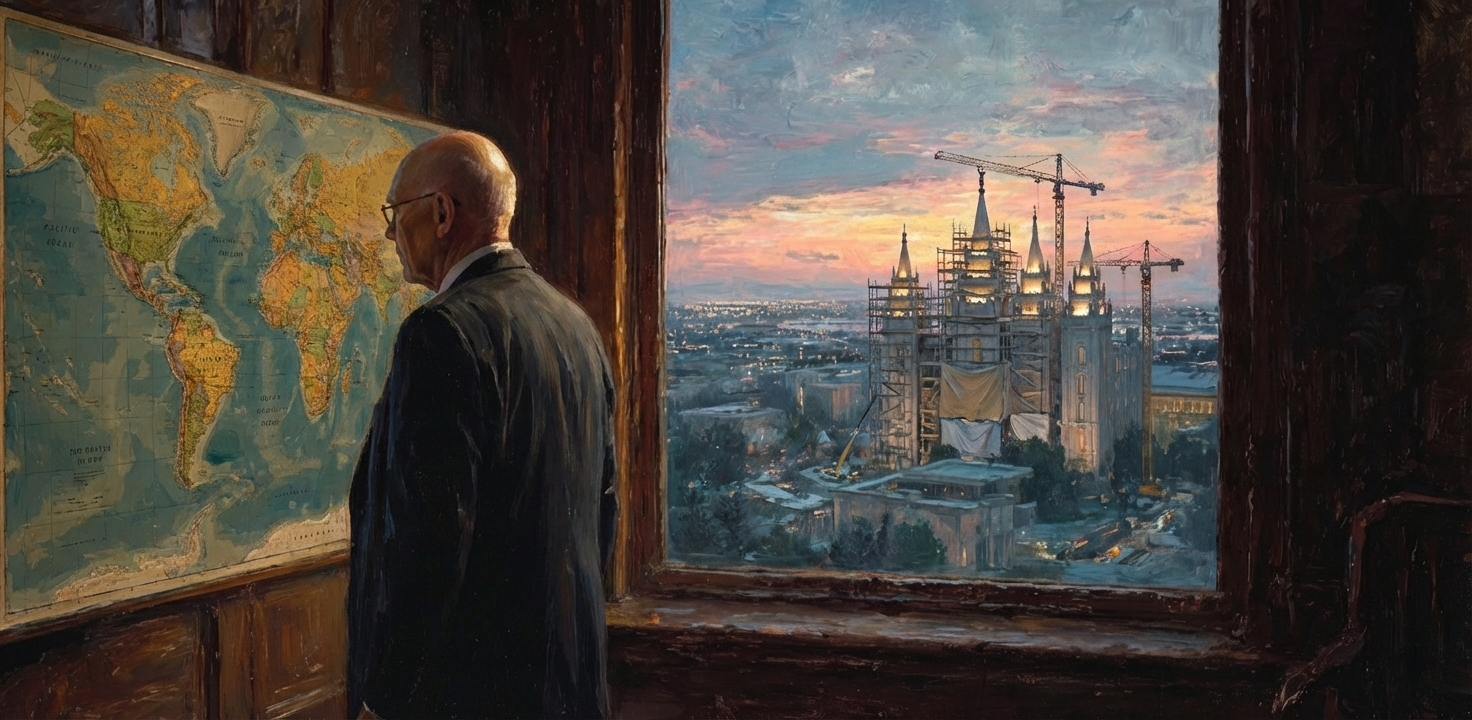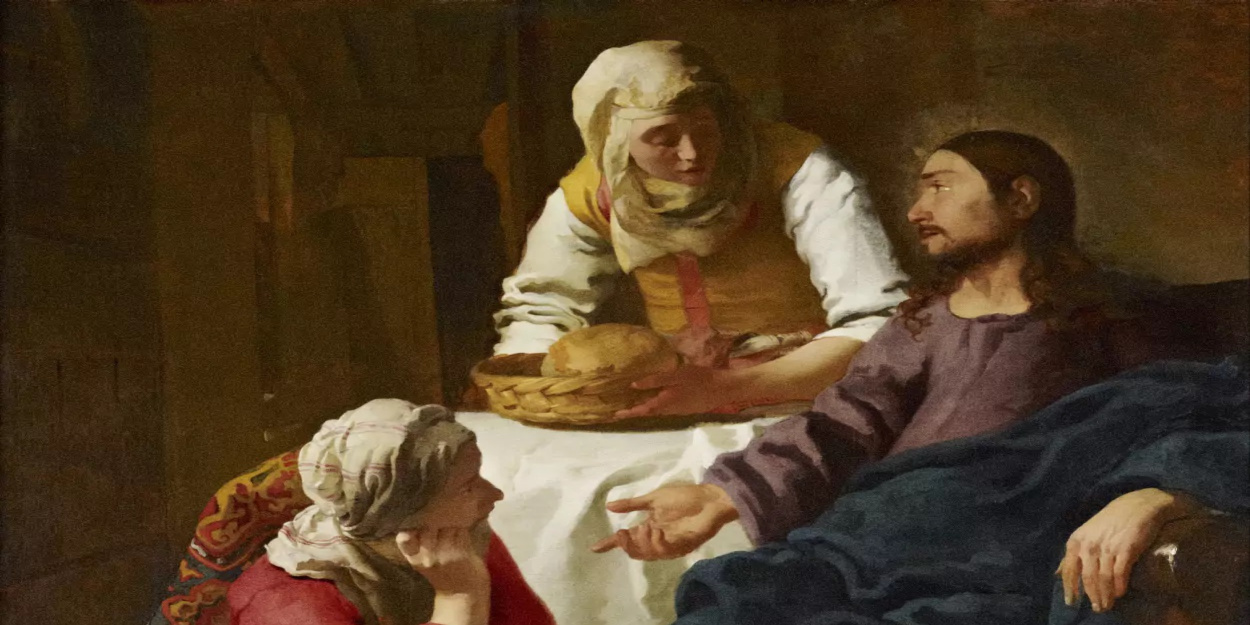One of the things that I love most about the Hebrew Bible is the boldness of language employed by the ancient prophets. In his seminal exploration of these prophets, the scholar, philosopher, and activist Abraham Heschel explains why this prophetic language is so unflinching. Heschel notes: “the prophet hates the approximate, he shuns the middle road … [because] the words the prophet utters are not offered as souvenirs … In speaking, the prophet reveals God … He discloses divine pathos … [the prophet is] not an instrument, but a partner, an associate of God” (emphasis original). Hebrew Bible prophets, Heschel suggests, do more than just provide guidance; they actually reveal God by providing us a sense of how God feels (what Heschel calls ‘divine pathos’). Timid language will not do when it comes to revealing who God is and how God feels; there is no “middle road.”
Perhaps because the language can feel so jarring, I think it is easiest to see prophetic avoidance of the “approximate” occurring when it comes to language of condemnation. Whether it’s the Thou shalt nots of the Decalogue or God’s unequivocal dismissal of ritual observance that is not accompanied by justice (mishpat) and righteousness (tsedeq) (See, for instance, Jeremiah 6:10-21; Isaiah 1:10–15; Amos 5:21–27)—as just two examples—God’s not-middle-road-ness comes through clearly and in evocative ways when God is speaking against something. In fact, it is the presence of (and prevalence of, if we’re being honest) such language that often leads Christians to give the Hebrew Bible short shrift because it does not feel like the God they have come to know through the New Testament and/or, for members of The Church of Jesus Christ of Latter-day Saints, the Book of Mormon, Pearl of Great Price, and Doctrine and Covenants.

I believe that Ezekiel chapter 36 remedies that feeling. This remarkable chapter of scripture, delivered by a prophet in exile to a people who had suffered the destruction of many of the things that served as cornerstones of their cultural and religious identity—their land, their kingdom, their temple, etc.— is (true to Heschel’s description) a prophetic disclosure of divine pathos. Yet, what makes this section of scripture of text memorable is not the language of condemnation but the way in which God is revealed as fiercely committed to Israel’s restoration. What’s more, the not-middle-of-the-road-ness found in Ezekiel 36 culminates in God’s commitment to act on behalf of Israel (and it might even be said in spite of Israel!). Over and against the predisposition to see the Hebrew Bible as text focused on rules and filled with disapproval for the people’s inability to keep those rules, Ezekiel 36 discloses God’s deep feelings for Israel and demonstrates that God does not “approximate” when it comes to Israel’s restoration. There is no spiritual activity that is not physical, nor physical activity that is not spiritual.
Thus says the Lord God: It is not for your sake, O house of Israel, that I am about to act but for the sake of my holy name … I will sanctify my great name … and the nations shall know that I am the Lord … when through you I display my holiness before their eyes.
I will take you from the nations and gather you from all the countries and bring you into your own land.
I will sprinkle clean water upon you, and you shall be clean from all your uncleannesses, and from all your idols I will cleanse you.
A new heart I will give you, and a new spirit I will put within you, and I will remove from your body the heart of stone and give you a heart of flesh.
I will put my spirit within you and make you follow my statutes and be careful to observe my ordinances.
Then you shall live in the land that I gave to your ancestors, and you shall be my people, and I will be your God. I will save you from all your uncleannesses, and I will summon the grain and make it abundant and lay no famine upon you. I will make the fruit of the tree and the produce of the field abundant, so that you may never again suffer the disgrace of famine among the nations….
It is not for your sake that I will act … let that be known to you …
On the day that I cleanse you from all your iniquities, I will cause the towns to be inhabited, and the waste places shall be rebuilt. The land that was desolate shall be tilled, instead of being the desolation that it was in the sight of all who passed by. And they will say, “This land that was desolate has become like the garden of Eden, and the waste and desolate and ruined towns are now inhabited and fortified.”
Then the nations that are left all around you shall know that I, the Lord, have rebuilt the ruined places and replanted that which was desolate; I, the Lord, have spoken, and I will do it … I will also let the house of Israel ask me to do this for them: to multiply their people like sheep. Like a consecrated flock … so shall the ruined towns be filled with flocks of people. Then they shall know that I am the Lord.
Fully aware that there are many things in this text that deserve highlighting, I will focus on three that speak most directly to me and my faith as a Latter-day Saint believer in Christ: (1) the reality that God acts; (2) the fact that God cleanses; (3) and the recognition that there is no hard division between the spiritual and the earthly.
First, God Acts
Perhaps the most remarkable and distinguishing feature of this set of verses is the way in which all of the action is attributed to God, “I am about to act,” God says. And act God does: “I will sanctify my great name … I display my holiness … I will take you from the nations … I will sprinkle clean water upon you … A new heart I will give you … I will put my spirit within you … I will save you from all your uncleannesses … I will summon the grain and make it abundant … I will make the fruit of the tree and the produce of the field abundant … I will cause the towns to be inhabited … I, the LORD, have rebuilt the ruined places … I will do it.” That is quite a list! In fact, there is only one action in this entire section of scripture that is attributed to Israel—the people of Israel are to “ask [God] to do this for them”—every other action is one that the LORD takes.
In a faith that is built on the principle that we should “act and not be acted upon,” which embraces hard work and industriousness, and take seriously the now-apocryphal aphorism to “pray as if everything depends on God and work as if everything depends on you,” we can sometimes forget that (1) God is as invested (in fact, probably significantly more invested) in accomplishing this work than we are, and that (2) God has and will continue to act on behalf of, and often in spite of, us. Yet this reality is clearly part of Latter-day Saint teachings. For instance, when Joseph Smith wrote that “the standard of truth has been erected: no unhallowed hand can stop the work from progressing … the truth of God will go forth boldly, nobly, and independent,” he clearly signals that God’s truth will proceed forth independent of any single individual human action. This sentiment resonates with our understanding of the image of the “stone was cut out of the mountain without hands” that eventually “filled the whole earth,” found in Daniel 2, wherein God’s work proceeds under its own momentum (see also D&C 65:2). Further, in the Allegory of the Olive tree (Jacob 5) much of the work of planting and caring for the various olive trees is attributed directly to the “Lord of the vineyard.” Though it is the case that servants are sometimes invited to participate in this effort, not all actions include servants, and even those that do are clearly instigated by the vineyard’s master. Finally, in the Book of Mormon, God says exceptionally clearly, twice in the space of two verses, “I am able to do mine own work” (2 Nephi 27:20-21).
To be clear, I do not believe the message we should take away is that there is no role for us. Rather, Ezekiel seems to be trying to teach Israel that when it comes to accomplishing God’s ends, much of what God intends for us is, frankly, outside of our ability to control (a point which I explore in more detail in another Public Square Magazine article). And thus, Ezekiel (a prophet in exile) seems to be saying to Israel (a people in exile): do not lose hope; God will act, and restoration will come; and do not fear because there is no middle-of-the-road-ness when it comes to that promise. God is true to God’s word.
That message of hope may be needed today more than ever.
Second, God Cleanses
One of the central critiques that Ezekiel levees against Israel, and the reason he says Israel was eventually exiled, is that “when the house of Israel dwelt in their own land, they defiled it by their own way and by their doings: their way was before me as the uncleanness of a removed woman” (Ezekiel 36:17). For Ezekiel, likely a well-connected, Jerusalem-based priest who worked in the temple and oversaw temple rituals, this phraseology is connected to the notion of moral and ritual impurity (explored in great detail in Leviticus 11-16). Very briefly, the idea is that because Israel engaged in activities that made them both morally impure (e.g., violating ethical standards) and ritually impure (e.g., coming in contact with prohibited items), the land where Israel dwelled became so tainted that God could no longer remain and thus Israel was expelled from the land. (As an aside, this is basically an extension of Israel’s understanding of the effect of sin on the temple and the very thing that Yom Kippur sought to remedy, discussed further below.) But, according to Ezekiel, this expulsion from the land is not forever. God will cleanse Israel and the land, and in so doing, set the stage for their return home.
God does this cleansing in two parts. First, God will address Israel’s ritual impurity. In most instances (and this is a simplification, but sufficient for this discussion), the process for remedying ritual impurity comes down to “washing and waiting.” Whether it is coming in contact with a corpse or having a skin disease (for instance), washing the thing which is contaminated and waiting a set period of time is how a person moves from ritually impure to ritually pure. And that is what God will do for Israel. According to Ezekiel, God will “sprinkle clean water upon” the people who have waited in exile. The result is that Israel “shall be clean” from all of its “uncleannesses.” In short, God will act to make Israel again ritually pure.
Second, now that Israel is ritually pure, its moral impurity can be addressed. Moral impurity is usually remedied through temple sacrifice (again, a simplification, but sufficient for this discussion)—hence the reason the ritual impurity needed addressing first, so that temple access is allowed. However, since Israel no longer has a temple, there is little it can do to take the steps needed to achieve moral purity. But do not despair, Ezekiel seems to say—because God will accomplish this as well. According to Ezekiel, God will facilitate Israel’s moral purity through direct intervention. Rather than requiring a sacrifice, God will simply act to change Israel’s nature. God will “cleanse” Israel from “all your idols” and give Israel a “new heart” and a “new spirit;” God “will remove from your body the heart of stone and give you a heart of flesh” and “put [God’s] spirit within you.” And the result of these many actions on God’s part will be that the people will follow God the right way. Remarkably, in this set of verses, there is no action that seems to be directly required on the part of Israel for this to occur. Ezekiel portrays this action as a continuation of God’s covenant fidelity to the people Israel.
This way of talking about “cleansing” runs against the way we sometimes teach about repentance. My experience is that the occasionally imprecise language we use leads to the idea that God cannot cleanse us unless we pass through specific (often neatly alliterated) steps. That is to say, sometimes (contrary to what Ezekiel seems to present), we may unintentionally teach God’s freedom to cleanse us is contingent upon our specific actions. However, in fact, Latter-day Saint teachings are fully consistent with Ezekiel’s language above. For example, our doctrine accepts that we are all cleansed from the effects of death via Jesus’s atonement and not because of any particular step we take (1 Corinthians 15:20–22; 2 Nephi 9:6–13). And when we realize that the Biblical words most often translated as “repent,” shub in Hebrew and metanoia in Greek, mean to “turn back” and “change one’s mind,” respectively, then it becomes clear that while we may take steps toward becoming better than we once were, the overcoming of past shortcomings is not a result of anything we have earned or the inevitable outcome of specific action on our part, but instead a gift that God provides to those whom God loves. Further to this point, in referencing 2 Nephi 25:23, Elder Dieter Uchtdorf notes potential confusion surrounding Nephi’s phrase “for we know that it is by grace that we are saved, after all we can do.” He then explains, “I wonder if sometimes we misinterpret the phrase ‘after all we can do.’ We must understand that ‘after’ does not equal ‘because. … We are not saved ‘because’ of all that we can do … Today and forevermore, God’s grace is available.” King Benjamin drives this point home most clearly, perhaps, when he notes that even if we serve God in every possible way (including through repentance), we are still unprofitable servants and remain eternally in debt to God’s sustaining and saving actions (Mosiah 2:21-24). In short, Latter-day Saint teachings reinforce, just as Ezekiel explains, that God’s freely given actions are the overriding and central source of our movement from moral impurity to moral purity.
Third, God Does Not See Divisions between the Spiritual and the Earthly
Consistent with Ezekiel’s view that the actions of Israel tainted the land itself, the cleansing of Israel includes a cleansing of the land. For Ezekiel, as noted above, this is more than just metaphorical. Since the days of the Tabernacle, Israel believed that the sins of the community actually left a “residue of uncleanliness” on the sanctuary. And this “residue” impacted God’s ability to dwell in the sanctuary and thus with them. Extending this notion, Ezekiel asserts that Israel’s actions were such that the land itself was so tainted by Israel’s actions that God could no longer dwell there. So, for Ezekiel, God’s act of cleansing Israel from moral and ritual impurity must necessarily include God cleansing the land as well. In so doing, both the people and the land would be prepared to receive God’s renewed presence. Will we embrace the God that Ezekiel reveals to us?
Again, this view is consonant with modern prophetic teaching. In Doctrine and Covenants 29, there is an extended discussion of God’s works, including both the creation and the provision of laws. In both instances, God is clear that while it may be helpful for humankind to make a distinction between the temporal and spiritual, for God, there is no difference. In fact, from God’s perspective, stated in that same Section 29, “my works have no end, neither beginning”—that is to say, both acts, creation and the giving of laws, are eternal, and they are interconnected. Indeed in multiple places (and especially in the Doctrine and Covenants), God’s work in total is described as “one eternal round” (see D&C 3:1-4 and D&C 35:1, for instance). Indeed, the work which God describes as “my work and my glory” (the immortality and eternal life of mankind, Moses 1:39) requires the creation of an Earth whereon “these [spirits] may dwell” (Abraham 3:24). Further, all ritual religious practices—sacrifice for ancient Israel, and baptism, sacrament, and prayer for Christians—suggests a clear link between physical actions and spiritual outcomes. Even temple work for the dead—a centerpiece of our belief—requires physical proxies for spiritual covenantal actions and is premised on the doctrine that the spirit and the body are the soul of man (D&C 88:15). All of this helps us appreciate the reality that the prophet Ezekiel pointed to anciently: there is no spiritual activity that is not physical, nor physical activity that is not spiritual, and thus cleansing the land and the people are simply different parts of the same action.
Conclusion
In my view, Ezekiel 36 is a wonderful example of what the prophetic language of the Hebrew Bible has to offer us today. As Heschel suggests, in this chapter, the historical person known to us as Ezekiel transcends his mortal condition and becomes a true associate of God. In so doing, Ezekiel reveals to us a God who acts to cleanse the people of the covenant and the land where they lived. Ezekiel reveals a God driven by divine caring and concern and one who, when it comes to covenant relationship, is even more deeply committed than the children of Israel are. Yet, even while this section of scripture is temporally locatable (Babylon in the 6th Century BCE), it teaches principles and ideas that are eternal in nature. In Ezekiel 36, we are confronted with the remarkable opportunity to trust that God will do the things for us that we are unable to do for ourselves. The only question is will we embrace the God that Ezekiel reveals to us?

















